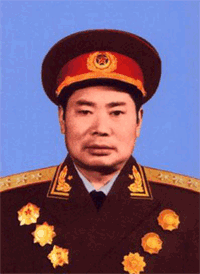Yang Dezhi
Yang Dezhi ( Chinese 杨得志 , Pinyin Yáng Dézhì ; * 1911 in Liling , Zhuzhou , Hunan ; † October 25, 1994 ) was a Chinese general of the People's Liberation Army and a politician of the Chinese Communist Party (CCP), who was chief of the General Staff between 1980 and 1987 so that was the military commander of the armed forces.
Life
Joined the People's Liberation Army and the Chinese Civil War
Yang Dezhi was initially a shepherd and then in 1924, when he was thirteen, a worker in a mine in Anyuang near Pingxiang . After he was fired for failing to do the heavy lifting, he returned to farming, and in 1926 he worked for the Hengyang Railway Company . He followed Mao Zedong to Changsha in the summer of 1927 , where he took part in the uprising that was suppressed there. In 1928 he became a member of the Chinese Communist Party (CCP). After taking part in the Long March between 1934 and 1935 as commander of a regiment of the People's Liberation Army , which had a significant share in battles against the troops of the National Revolutionary Army of Chiang Kai-shek at the Luding Bridge on the Dadu He River in May 1935.
In September 1937 he took part as commander of the 685th Regiment in the course of the Second Sino-Japanese War in the course of the larger Battle of Taiyuan as part of the 8th Army commanded by Lin Biao in skirmishes against the Imperial Japanese Army at the Battle of Pingxingguan . He was a graduate of the Anti-Japanese Military and Political College in Yan'an , headed by Lin Biao from 1937 to 1943 and then by Xu Xiangqian from 1943 to 1945 . Afterwards he was the commander of larger units in the border area between the provinces of Hebei , Shandong and Henan and finally in 1945 the commander of a division. During the final phase of the Chinese Civil War he was in command of the Battle of Baoding from June to July 1947, in the campaign of Hebei, Rehe and Chahar from May to June 1948, and in September 1949, commanding general of the XIX. Corps at the Battle of Ningxia .
People's Republic of China and Chief of the General Staff
After the founding of the People's Republic of China , Yang Dezhi found various uses as an officer and was deputy commander of the troop contingent of the People's Liberation Army and commander of the XIX during the Korean War as a representative of Peng Dehuai . Army group that included General Fu Congbi's 63rd Army , General Zeng Siyu's 64th Army, and General Xiao Yingtang's 65th Army . In 1955 he was one of the first officers to be promoted to general .
On the VIII. Congress of the CCP in 1956 , he was candidate of the Central Committee (CPC Central Committee) and has held this position until 1969. He served between September 1958 and January 1974 as commander of Military Region , Jinan . On the IX. At the CCP Congress, he became a member of the CCP Central Committee, of which he was a member for 18 years until 1987. As the successor to Wang Xiaoyu , he took over at the same time in March 1971, the post of Secretary of the Party Committee and as Chairman of the Revolutionary Committee of the province of Shandong and held these functions until his replacement by Bai rubing in November 1974. He then served from January 1974 to January 1979 Commander of the Wuhan military region and then from January 1979 to February 1980 commander of the Kunming military region . As such, he was from February 17 to March 16, 1979, together with Lieutenant General Liu Zhijian in Kunming, responsible for planning the operations of the units of the People's Liberation Army in the Sino-Vietnamese War during the Battle of Lào Cai .
Yang Dezhi then succeeded Deng Xiaoping as Chief of the General Staff in 1980 and was therefore the military commander of the armed forces until he was replaced by General Chi Haotian . On the XII. At the 1982 Congress, he also became a member of the Politburo of the Communist Party of China , the central body of power in the People's Republic of China, which has all executive powers between the plenary sessions of the Central Committee of the Communist Party of China and which has the actual decision-making power over the guidelines of politics. He was a member of this body until 1987.
In June 1989, Yang was one next to Ye Fei , Zhang Aiping , Chen Zaidao , Xiao Ke , Song Shi-Lun and Li Jukui to a group of six former generals who invited in a letter the government that the People's Liberation Army does not violate the student protest movement on go to Tian'anmen Square and demand a peaceful solution.
Web links
- Entry in China Vitae
- Biography in the Munzinger archive (top of the online version)
- Yang Dezhi, 83; a Leader of the Red Army . In: The New York Times, October 27, 1994
Individual evidence
| personal data | |
|---|---|
| SURNAME | Yang, Dezhi |
| ALTERNATIVE NAMES | 杨得志 (Chinese) |
| BRIEF DESCRIPTION | Chinese politician and general |
| DATE OF BIRTH | 1911 |
| PLACE OF BIRTH | Liling , Zhuzhou , Hunan |
| DATE OF DEATH | October 25, 1994 |

